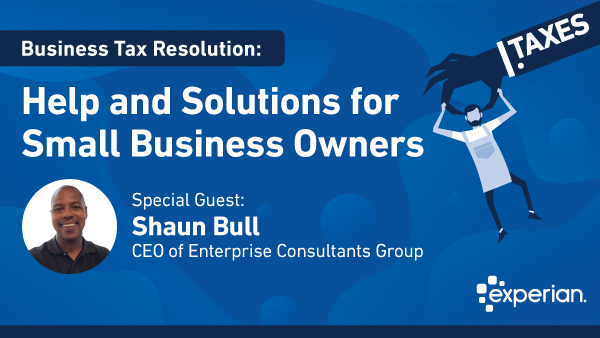Business Credit Education
articles and videos about business credit education

Whether as a startup investment or a springboard for growth, a small business loan can help you achieve your goals. But securing the right loan at a favorable rate isn't always straightforward, particularly during inflationary times. The key to getting approved at more favorable rates lies in building and maintaining a strong business credit score. Here’s how to navigate the loan landscape and unlock your growth potential with a credit-savvy approach. Why Business Credit Matters More Than You Think Many entrepreneurs are unaware that their business has a credit score that is separate from their personal one. This business credit score significantly impacts your loan eligibility and potential interest rates. Lenders use it to gauge your business's creditworthiness, much like they use your personal credit score for individual loans. A crucial first stop in your journey to capital is to check your business credit score. You should do this before you start filling out a loan application. Experian has tools to help you understand your score as it stands now, and identify areas for improvement, so when you do apply for a loan, your credit looks good. Consider monitoring your business credit report for fraudulent activity that could damage your score. Preparing for Loan Success: Beyond the Score While a strong business credit score is essential, it's not the only key to unlocking a great loan for your business. Here are additional steps to prepare for a smooth loan application process. Understand Your Borrowing Needs: Identify the type of financing you require. Short-term loans might suit immediate needs, while long-term loans support expansion plans. When considering the amount of money you will ask for, be sure to know what kind of payments you will be able to make. Know Your Loan Options: Explore various lending options for small businesses, including traditional banks, credit unions, online lenders, CDFIs and the Small Business Administration (SBA). Each offers different loan amounts, annual percentage rates (APRs), and repayment terms. Some institutions offer loans reserved for women business owners and/or members of underrepresented populations. Write a Compelling Business Plan: A good business plan is pivotal to securing financing and guiding your small business towards success, and you need one for many reasons—not just getting a loan. A business plan can serve as a guidepost during rough times, and help you stay focused on your goals. It should be clear, concise and compelling, demonstrating a thorough understanding of your business model, market, and financial projections. Gather Financial Documents: Prepare tax returns, financial statements, and business bank statements to showcase your financial health and cash flow. Since most loan applications are online, be prepared to submit these documents digitally. You may need to download PDF statements from your bank, or scan documents that you can’t access online. Consider Collateral: Depending on the lender and loan type, collateral like equipment or inventory may be required to secure the loan. You can still apply for loans if you don’t have anything to use as collateral, but be aware that having collateral may give you more options. Beyond Traditional Banks: Expanding Your Loan Universe Don't limit yourself to traditional banks. Consider these alternative lenders. Credit Unions: Often offer competitive rates and flexible terms, especially for established businesses with good credit. They may also be more likely to approve loans for startups or businesses with weaker credit. Online Lenders: Provide a streamlined application process and fast funding, but interest rates might be higher. SBA Loans: SBA loans offer favorable terms for eligible small businesses, and can be more accessible than traditional loans. They do have a lengthy application process. SBA loans are made through banks and other lenders, but carry additional rules since they are backed by the United States government. Learn more about SBA loans. Fintechs: These companies use technology to enhance or automate financial services. They leverage software and mobile apps and typically offer a wide range of financial services, sometimes with more flexibility, efficiency, and lower costs than traditional banks. Fintech companies are known for their innovative approach to underwriting, often considering a broader range of data points than traditional lenders. This can result in more accessible financing options for small businesses, including those with less-than-perfect credit histories. Microlenders: Microlenders are non-profit organizations that specialize in providing small loans to startups and businesses in underserved communities. They may offer more flexible terms than traditional lenders, but they may also have lower loan amounts. CDFIs: Community Development Financial Institutions are mission-driven lenders that specialize in providing financial resources to underserved communities. This includes small businesses that might have trouble qualifying for traditional bank loans due to factors like credit score, collateral, or being located in a low-income area. CDFI Friendly America is a great place to start. Minority Business Development Agency (MBDA) Centers: An MBDA Center is a localized resource center operated under the umbrella of the U.S. Department of Commerce's Minority Business Development Agency. MBDA Centers specifically focus on assisting minority-owned businesses. Ready, Set…Start applying for business loans Now that you’ve checked your business credit score, developed a solid business plan, assembled your financial documents and researched the best loans for your business, you’re ready to start the application process. In most cases in 2024, this will be an online process, at least up front. Make sure you have a good internet connection and ready access to digital versions of all the documents you’ve gathered. If you can look at loan applications ahead of time, it’s great if you have already written out answers to any long-form questions they may ask. The secret to loan success lies with your business credit score, but it’s also in the details of your application. If you follow directions, answer every question, provide all requested information and meet deadlines, you are much more likely to secure the funding you seek. Experian Offers Support Every Step of the Way Experian is your partner in building a healthy business credit profile. Utilize our business credit score planner and monitoring tools to stay informed and proactive. Additionally, explore our educational resources to deepen your understanding of business credit and financing options. With a strategic approach and a focus on building strong business credit, you can unlock the doors to the right loan and propel your business to new heights. Remember, your business credit score is your business's financial passport to success. Start building yours today!

Explore small business loans for women: expert tips on financing options, credit scores, and essential resources for female entrepreneurs

Comprehensive listing of 100 business grants for women compiled by Experian.

Shaun Bull, founder and owner of Enterprise Consultants Group, explains what tax resolution involves and how his firm assists small businesses in efficiently resolving their tax matters to get them back on track.

Mike Olson, Owner of Evenflow Sewer and Drain Service in Kings Park, New York shares how his subscription to Experian Business Credit Advantage has helped him gain access to more favorable financing options.

The legal structure of a business is one of the biggest decisions you'll make as a small business owner. Get information on the most common types, with pros and cons.

Separating business and personal finances is not just an option, it's a vital step towards safeguarding your assets, building a strong credit foundation, and gaining control over your business's financial health.

Both businesses and individual consumers have credit scores that reflect how they’ve historically used credit. Lenders and others use these scores to help determine creditworthiness and make decisions based on what they see. Your Business credit score is based on different information than personal credit scores and use a different scoring system. Learn now to check your business credit score. How Do Business Credit Scores Work? Business credit bureaus use information from a wide range of sources to compile business credit reports, which are then used to generate business credit scores. Data in business credit reports may come from your business’s creditors; its vendors and suppliers; public records and court filings; and collection agencies. For instance, Experian business credit reports show data such as location and contact information, time in business, the company’s Standard Industrial Classification (SIC) and North American Industrial Classification System (NAICS) codes, annual sales and number of employees. It will also show any judgments, UCC filings or tax liens against your company and any accounts in collections. Finally, it looks at how you handle commercial credit payments on loans, credit cards, and bank or trade lines of credit. Each business credit reporting agency weighs the information in your credit report differently and uses its own unique method to calculate your credit score. For example, Experian calculates your business credit score based on: Credit: Number of trade accounts, outstanding balances, payment behaviors, credit utilization and trends over time Public records: How recent and how frequent any liens, judgments or bankruptcies are and how much money was involved Demographics: The number of years you’ve been in business, your SIC and NAICS codes and the size of the business Experian Business Credit Scores range from 1 to 100. As with consumer credit scores, higher scores signify better credit. Where Can I Check My Business Credit Score? You can check your Experian business credit score by purchasing a one-time copy of your credit report or signing up for business credit monitoring, including unlimited access to scores. Reasons to Check Your Business Credit Score Prevents fraud: Monitoring your business credit score can reveal potential fraud or identity theft. A new account you don’t recognize, an application for credit you didn't make, or inaccurate information could be a sign of fraudulent activity. Contact the credit bureau if you see anything amiss on your business credit report. Monitors business health: Your business credit score is an indicator of the financial health of your business. A good business credit score can open doors, giving you access to more credit, lower interest rates and better loan terms. Your business credit may be the deciding factor in whether you get approved for a lease or for trade credit. Regularly checking your business credit score gives you a sense of where your business stands and how successful your applications for credit are likely to be. Safeguards your personal assets: Without a good business credit score, you may need to personally guarantee business loans or use your personal credit score to apply for business credit. This could put your personal assets—and personal credit score—at risk if your business suffers a downturn and you can’t pay these bills. A good business credit score can help you get credit in your business’s name, protecting your personal assets. How to Establish and Build Business Credit Start establishing a business credit history by legally registering your business and getting an employer identification number (EIN) from the IRS. Open business bank accounts, leases, utility services and other accounts in your business’s name, rather than your own. You can begin to build business credit by making moves such as getting a business credit card and requesting trade credit from suppliers, then making your payments on time. For these payments to help your business credit score, you’ll need to work with companies that report to business credit bureaus. Not all of them do, but companies are often willing to do so if you ask. As with personal credit, paying your creditors on time is key to improving your business credit score. You should also check your business credit score regularly, making sure the information in your credit report is correct and current. Keep Your Business Credit Score Healthy Regularly monitoring your business credit score helps keep a pulse on the health of your business—but as a business owner, you already have a lot on your plate. For a convenient way to track your credit score, sign up for business credit monitoring services such as Experian’s Business Credit AdvantageSM. It provides alerts whenever your business credit score changes and early warnings of potential fraud to give you peace of mind. Plus you get unlimited access to your business credit report and score all year long. About the author Karen Axelton Drawing on 20-plus years of experience as a journalist, business magazine editor, and marketing copywriter, Karen Axelton specializes in writing about business and entrepreneurship. She has created content for companies including American Express, Bank of America, MetLife, Amazon, Cox Media, Intel, Intuit, Microsoft and Xerox.

Regularly checking your business credit score helps protect both you and your business in several ways. We cover three primary reasons in this post.
